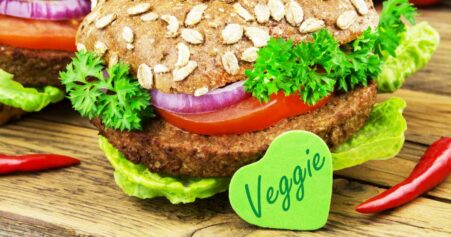Table of Contents
What are the advantages and disadvantages of a vegan diet?
I want to go vegan! The first idea to transition to a vegan diet is usually followed by research on the advantages and disadvantages of this way of eating. But then you are confronted with countless pieces of information, ranging from testimonials to cures to warnings of serious health consequences. How does a vegan diet really affect the body?
Below you will find an overview of the potential advantages and disadvantages of a vegan diet, mainly focussing on the effects of a vegan diet on the body and thus on health.
Vegan Diet: Advantages
- subjective well-being by acting in accordance with one’s own values and beliefs
- reduction of animal suffering
- easily provides most nutrients (especially vitamin C, vitamin E, potassium, magnesium, folic acid, carbohydrates) to meet needs
- can be inexpensive
- high intake of phytochemicals
- high fiber content = health benefits
- substitute products offer familiar taste with less animal suffering
- discovery of new products and recipes
- lower average energy density ↓ easier weight management
- need for decision making ↓
- possible lower intake of potentially harmful substances (for example from processed red meat)
- risk of foodborne illness ↓ (for example from Salmonella, Campylobacter, Clostridium botulinum, Listeria)
- possible risk reduction for some diseases
- positive environmental impact – researchers consider a reduction in the consumption of products of animal products necessary or environmental sustainability
- consumption of resources ↓ → social equity
(Bakaloudi et al., 2020; Marrone et al., 2021; Menzel et al., 2020; Springmann et al., 2016).
But the vegan diet also faces criticism. Some consider it a “malnutrition”. But does a vegan diet really make people sick and is it complicated?
Vegan Diet: Disadvantages
- adequate intake of some nutrients to meet needs is more difficult
- may be more expensive
- requires more detailed reading of the ingredient list and knowledge of the origin of the ingredients
- more difficult to eat spontaneously on the go
- negative/rejectionary reactions from the social environment
- no more use of some familiar recipes
- food and meal choices ↓
- low energy density → unintended weight loss
- underestimated energy density → unintentionally high caloric intake
- alternative products may be low in micronutrients compared to their counterparts of animal origin
- digestive problems possible (initially)
Summary: Advantages and Disadvantages of a Vegan Diet
With a vegan diet, you usually automatically consume many health-promoting substances such as vitamins and minerals, fiber, and phytochemicals. However, risk of deficiencies in some nutrients is increased. Potentially critical nutrients on a vegan diet include
These are considered potentially critical because their amount and/or bioavailability in plant foods is low. However, even a mixed diet does not protect against nutrient deficiencies. A healthy diet is possible with or without products of animal origin. Each type of diet has its pros and cons and specific aspects that require a little more attention. In our society, most people are deficient in omega-3 fatty acids, vitamin D, iodine, selenium, and often vitamin B12 and iron, so this risk is not unique to vegan diets. With a few tips, however, you can avoid deficiencies.
In the beginning, it can be difficult to get used to not being able to eat “anything, anytime, everywhere” and it is necessary to look at the ingredients. But with a little time, this is no longer necessary, goes faster, and thanks to the growing availability and labeling of vegan foods, you can almost always find something vegan to eat. Nowadays, the “problem” with being vegan is more that it is almost impossible to try all the new products that are hitting the market. Probably not all of them will taste good to you, but that is also the case with non-vegan products. Even without the substitute products, there is a wide variety of delicious vegan foods to choose from, as our Vegan Food Pyramid shows.
The question you might ask yourself is: Aren’t less animal suffering, environmental protection and social responsibility worth deviating a little from the majority?
Tips for Maximizing the Advantages and Minimizing the Disadvantages of a Vegan Diet
- Reduce the risk of nutrient deficiencies by consuming foods high in potentially critical nutrients frequently, increasing bioavailability through preparation, and minimizing losses during storage and preparation. For tips on how to do this, see our series of articles on individual nutrients.
- Use the Vegan Food Pyramid to guide your food choices, and check in regularly with your health care provider to check important health parameters.
- Use preparation methods that improve digestibility and tolerance (for example soaking, cooking, sprouting, fermenting).
- Shop locally and seasonally – this will save you money and help the environment.
- Make shopping easier by looking for vegan-labeled foods and meals.
- Focusing on staples will save you money – it does not always have to be a ready-to-eat burger or the fancy vegan restaurant.
- Do not make it more complicated than it has to be: If you do not like to experiment in the kitchen, stick to simple meals and products that make it easy to eat according to your preferences and needs.
- Do not replace meat and dairy products 1:1 with (non-fortified) substitutes. They tend to have different nutritional values.
- When eating out, ask nicely about ingredients or adaptations.
- Try different products – especially direct alternatives to products of animal origin vary in taste and everyone will find their favorite.
- Take advantage of the variety of vegan foods and discover new ones: tofu, tempeh, seitan, pseudo-grains, different types of lentils and beans, yeast flakes, vegetables and fruits you never knew existed, etc.
- Get information from reputable sources (for example official nutritional institutions).
- Try out new recipes. You will find many delicious recipes for every occasion on the internet or in cookbooks.
- Do not proselytize, but be understanding. Share when the other person is open to it. Tips for communicating with critical non-vegans in your immediate environment can be found in our article “5 Tips for Conflicts And Painful Pressure”.
- It does not have to be “perfect”. If you struggle and find it difficult, remember that we all start somewhere and that it will get easier. Do not hesitate to ask for help.
Hopefully, you now have a solid overview of the advantages and disadvantages of a vegan diet and know what you want to read more about. Then you can decide for yourself if you want to try a vegan diet and experience the benefits for yourself.









Leave a Reply